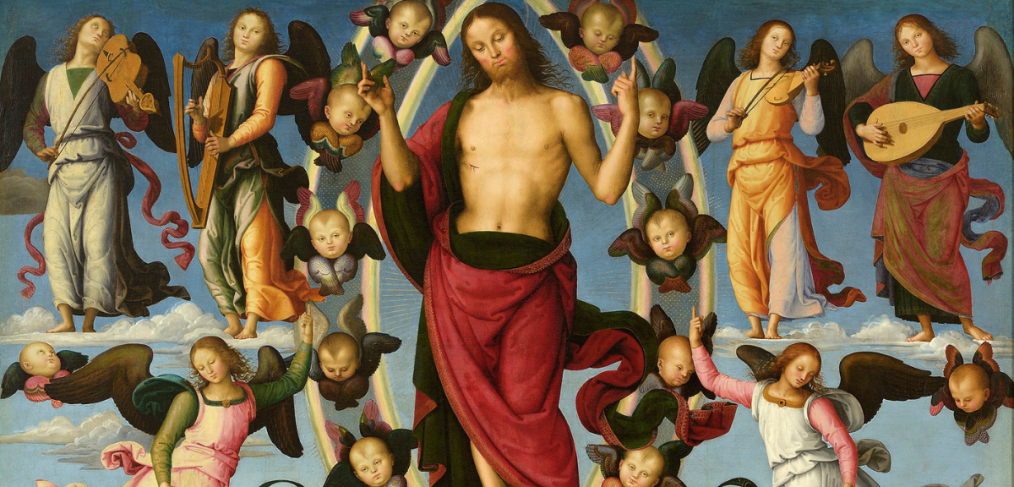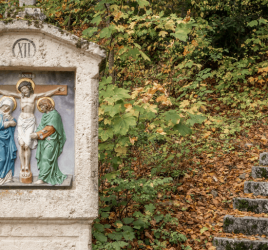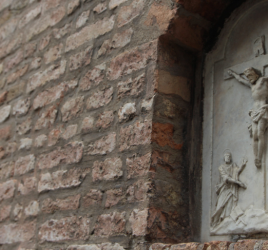
“Lift Up Your Eyes to the Heavens”: The Feasts of All Saints and All Souls
“The holy souls in purgatory — remember them often in your sacrifices and in your prayers. May you be able to say when you speak of them, ‘My good friends the souls in purgatory.’”
St. Josemaria Escriva
The Way, no. 571
The Communion of Saints: One in the Mystical Body of Christ
The feasts of All Saints (November 1st) and All Souls (November 2nd) bring into focus the Church’s teaching on the Communion of Saints, highlighting the eternal destiny of all believers. This communion includes not only those living on earth but also those in heaven and those in purgatory. The term “Communion of Saints” speaks to our shared participation in the Mystical Body of Christ, where the faithful are united in Christ and each person’s actions have an impact on the whole (Catechism of the Catholic Church, no. 954). To this point, Pope Benedict XVI said, “No man is an island, entire of itself. Our lives are involved with one another, through innumerable interactions they are linked together. No one lives alone. No one sins alone. No one is saved alone” (Spe salvi, no. 48).
All Saints: A Celebration of Everyday Holiness
The feast of All Saints honors not just the canonized saints of the Church but the countless unnamed holy men and women in heaven. These are people who lived out their faith in both the heroic and ordinary moments of life, embracing the struggles, joys, and responsibilities of a true Christian life. They show us that sainthood is not only reserved for a select few but that it is possible for everyone.
Inspired by this reality, St. Josemaria Escriva taught those around him how holiness can be found in the ordinary tasks of life. It is in the quiet, unnoticed moments of love, sacrifice, and perseverance that we grow closer to God. The saints serve as models of how to live a life devoted to God and their witness invites us to embrace our own call to holiness amidst the demands of work, family, and society.
All Souls: Praying for Those in Purgatory
While All Saints is a day of rejoicing for those who have reached heaven, All Souls is a solemn reminder of those still being purified in purgatory. The Church teaches that many souls, though saved, are not yet fully prepared to enter the presence of God due to lingering imperfections or attachments to sin. Purgatory is the state where these souls undergo purification, and we are called to assist them through our prayers, sacrifices, and especially through the offering of the Mass (Catechism of the Catholic Church, no. 1030). As St. Josemaria said, “Purgatory shows God’s great mercy and washes away the defects of those who long to become one with him” (Furrow, no. 889).
The souls in purgatory, often called the “holy souls,” are no longer distracted by earthly desires or temptations. Their gaze is fixed solely on God, longing for the moment when they will see him face to face. As they undergo their purification, they inspire us to focus our own lives more fully on God, reminding us to strive for holiness now. Our prayers for these souls help them on their journey, and in turn, they intercede for us.
Reflecting on the many difficulties he faced in founding Opus Dei and the intercessory power of the holy souls in purgatory, St. Josemaria said, “At the beginning I felt the company of the souls in purgatory very strongly. Due to the great services they have done for me, I like to foster in souls this reality: my good friends the souls in purgatory” (from The Way: Critical-Historical Edition, edited by Pedro Rodriguez, p. 740). Additionally, when speaking about St. Josemaria, Bishop Javier Echevarria remarked, “he urged us to be generous in the offering of suffrages. His great aspiration was that, all united, we might succeed in ‘emptying Purgatory,’ through the abundance of Masses offered and the generosity of our sacrifice and prayer.”
The Hope of the Resurrection and Eternal Life
Central to these feasts is the Church’s belief in the resurrection of the body and life everlasting. As Christians, we proclaim that death is not the end but the beginning of eternal life with God. St. Paul reminds us that Christ’s resurrection is the foundation of our hope saying, “…and he died for all, so that those who live would no longer live for themselves, but for him who died and rose on their behalf” (cf. 2 Cor 5:15). The hope of the resurrection sustains us in times of trial, helping us endure the struggles of life with the assurance that something far greater awaits us. Eternal life is not merely an abstract idea but a personal promise from Christ, who has gone ahead to prepare a place for us in the Father’s house.
Lifting Our Eyes Towards Heaven
St. Josemaria often spoke of the importance of living with our eyes fixed on heaven saying, “Heaven is the final destination of our path on earth. Jesus has gone ahead of us and awaits us there, in the company of Our Lady and of St Joseph, whom I so much revere, and of all the angels and saints” (Friends of God, no. 220). As we reflect on the Communion of Saints and the hope of resurrection, we can be inspired to commit ourselves to living each day with renewed purpose, striving for holiness in all that we do. In our efforts, the saints encourage us by bearing witness to the attainable nature of sanctity. The souls in purgatory remind us of the need for purification and the importance of intercessory prayer. And the hope of resurrection inspires us to live with the expectation that, by God’s grace, our earthly journey may lead to eternal life.
Cover Image: The Ascension of Christ by Pietro Perugino




